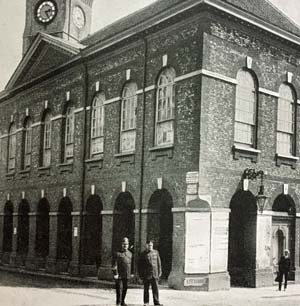Newbury Branch meeting held via Zoom on 14th October 2020
Speaker: Anthony Pick
Newbury’s Elizabethan charter of 1596 set out the town’s government under a mayor elected annually by the 24 burgesses. There have been 422 mayoral elections, for 314 individual office holders. Up to 1835 the mayoral duties covered law and order in the town, the poor law, the market, disputes, public entertainment, sabbath observation and royal proclamations. The mayor also served as the town’s chief magistrate until 1835, when the charter was abolished.
Statutes of the late seventeenth century established that only practising Anglicans could take mayoral office, but between 1660 and 1878 t least 11 per cent were non-Anglican. However, the requirement was only to take communion once a year.
Local residents had no say in electing the mayor until 1835, when property owners were enfranchised. In 1867 this was extended to male ratepayers. In 1869 single female ratepayers were admitted to vote. In 1894 married women could vote in local elections.
Notable mayors included:
Thomas Newman (1619), whose daughter Jane married Christopher Packe, Lord Mayor of London, who proposed making Oliver Cromwell king;
Edward Godwin (1706), a Congregationliast lawyer who was great-great-grandfather to Mary Shelley;
Slococks, a family who supplied five mayors in Georgian times;
Francis Page (1754), bargemaster whose son Frederick became a deputy lord-lieutenant of Berkshire;
Benjamin Merriman (1755) a clothier whose great-great-uncle escorted Charles I from captivity on the Isle of Wight to execution in London;
John Kimber (1758) who was found guilt of forestalling the market – his town hall colleagues attempted unsuccessfully to have his name erased from the mace he had donated;
Osman Vincent (1771) founded the Newbury Old Bank, which failed after an 1815 robbery;
Richard Baily (1773) was father of the astronomer Francis Baily;
William Budd (1789) was the lawyer who convened the meeting which produced the Speenhamland System of poor relief, friend of William Cobbett, and brother of Dr Richard Budd who employed the young Emma Hamilton (then calling herself Amy Lyon) as a housemaid;
Joseph Toomer (1791, 1801 and 1814), founder of Newbury’s famous ironmongery, also musician, painter, diarist and census-taker, whose wife was related to Clive of India and the Astronomer Royal Maskelyne;
Edward Gray (1835), a cheese factor who went into banking with Jane Austen’s brother and subsequently went bankrupt, later published the first history of Newbury;
Robert Ryott (1869, 1870) father of the silent-movie actor known as Stewart Rome.
Several mayors were founders of major businesses in Newbury:
Edward Pellew Plenty (1865) son of Plenty & Co founder;
Henry Dolton (1869) from the family who founded Dolton & Son millers and grain merchants;
Henry Midwinter (1887), another grain merchant;
Thomas Turner (1903) founder of the Newbury Weekly News;
Joseph Hopson (1882) and Alfred Camp (1910) together formed Camp Hopson department store;
John Rankin (1899, 1901, 1902) had a school named after him, was instrumental in founding the museum and library, and was the first freeman of the town;
George Cowslade (1663) built the (now) Camp Hopson building to entertain Charles II. Thomas Cowslade (1665) rebuilt Donnington Priory. William Adey built the present town hall.

Elsie Kimber, of the grocery family business, was Newbury’s first female mayor, elected in 1932, and was also the first female alderman, and rode a motorbike. There have been 21 more since, including Elizabeth Ganf (1966) who was a ballerina with the Ballet Russe. Frances Berry, author of four local history books, was Newbury’s oldest mayor. Elizabeth O’Keefe currently holds the post.
